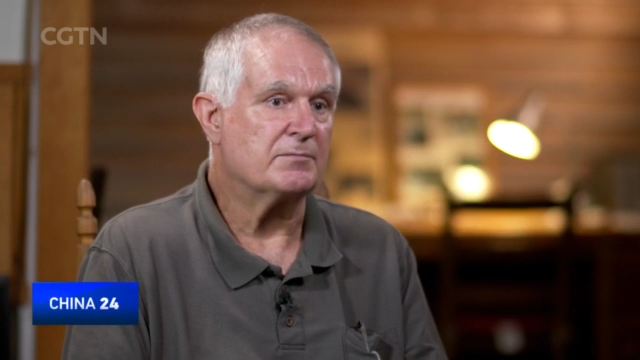
21:31, 20-Oct-2018
Bear Bonds: US biologist and Chinese researchers collaborate to save pandas
Updated
21:17, 23-Oct-2018
03:23

China has made great strides over the years in protecting its beloved giant panda. Those efforts are now getting a helping hand from an American biologist. His collaboration with Chinese scientists has even drawn the attention of Hollywood. CGTN's Frances Kuo travelled to the U.S. state of New Hampshire to show us his ground-breaking work.
The house sits deep in the woods of western New Hampshire. And when you step inside, Ben Kilham's true passion is on full display.
BEN KILHAM INDEPENDENT WILDLIFE BIOLOGIST "I've always had a gift with animals, I've always been able to understand them."
Black bears in particular. It all began 25 years ago when Kilham stumbled upon an abandoned black bear cub.
BEN KILHAM INDEPENDENT WILDLIFE BIOLOGIST "It was one that was sick, it had a congenital illness."
Now, he's considered an expert in his field.
BEN KILHAM INDEPENDENT WILDLIFE BIOLOGIST "I've had more than 10-thousand hours with a black bear beside me in the wild."
Behind the house is where Kilham truly feels at home in this three-hectare enclosure. His current extended family consists of seven orphaned black bear cubs. All seven months old.
Kilham bottle-feeds the cubs during their first 18 months of life. Then he accompanies them on walks untethered in the enclosure for up to 10 hours at a time. This method was initially considered controversial, making him somewhat of an outcast in the scientific world.
BEN KILHAM INDEPENDENT WILDLIFE BIOLOGIST "The scientific bear community had already made up their mind that people shouldn't work closely with bears."
He essentially serves as a surrogate mother to the cubs, requiring him to maintain close contact. When Kilham determines they're ready, the cubs are released.
FRANCES KUO LYME, NEW HAMPSHIRE "Kilham's work with black bears actually got the attention of researchers in China, they thought maybe his success with black bears could apply to their efforts with panda bears."
Their collaboration began in 2013 and continues to this day. Their joint work featured in an IMAX documentary titled 'pandas.'
Chinese researchers have visited Kilham's bear enclosure and used it as a model for one they've built in Chengdu.
But the collaboration has been a process -- including convincing Chinese researchers to think outside the box.
BEN KILHAM INDEPENDENT WILDLIFE BIOLOGIST "They didn't want pandas in the rain, they didn't want them climbing trees, all the things necessary to have pandas in the wild."
The Chinese scientists are using some of Kilham's methods to raise vulnerable giant pandas and eventually introduce them into the wild. The thinking is that both species of bears are similar so the approaches should work in the same way.
BEN KILHAM INDEPENDENT WILDLIFE BIOLOGIST "They have the same juvenile period, 18 months, they follow their mothers in the same way."
Kilham hopes the attention on their work will help others feel more at home with bears of all kinds, just as much as he does. And just as Kilham was once misunderstood, he wants bears to receive the same respect.
BEN KILHAM INDEPENDENT WILDLIFE BIOLOGIST "We've overrun the Earth and what's left needs all the help we can give it. If humans don't have the same level of interest in considering these things, they won't be there for kids in the future."
FRANCES KUO, CGTN, LYME, NEW HAMPSHIRE.

SITEMAP
Copyright © 2018 CGTN. Beijing ICP prepared NO.16065310-3
Copyright © 2018 CGTN. Beijing ICP prepared NO.16065310-3